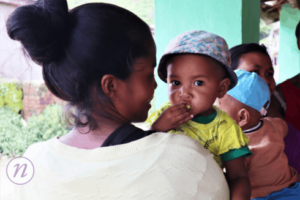Accelerating the Use of Data for Equality

Editor’s Note: This article originally appeared on the Cloudera Foundation website. In April 2021, the Cloudera Foundation merged with the Patrick J. McGovern Foundation.
by Claudia Juech, Nikita Japra
Feb. 25, 2021

Today, we are excited to officially launch the Cloudera Foundation’s new Data4Change Accelerator program, designed to be a more accessible form of support than the intensive multi-year partnerships that have marked the Foundation’s first three years.
Following more than 300 conversations with potential nonprofit grantees, we learned that many organizations were just beginning to explore novel ways to use their data beyond conventional monitoring, reporting, and evaluation activities. Some sought a means to move past a programmatic crossroads, others a new type of internal data management or a method to substantiate anecdotal evidence that could dramatically shift public policy. Yet, many of these nonprofits faced challenges — methodologically, technically and financially — to validate their data hunches in a way that would enable them to further build on the results, going beyond a one-off pilot.
With the six-month Accelerator program we intend to provide shorter-term, flexible, low-risk opportunities to build the confidence and the capacity of nonprofit teams around the use of new data technologies and approaches. We also want participating organizations to leave the program with clear information on next steps that could be the basis of future funding proposals or programmatic strategy.
At the same time, the COVID-19 pandemic has continued to lay bare and exacerbate deep-seated inequities built into how different members of our society are able to access health, education, wealth, jobs, and justice. As a team we took a step back to ask what role we can play in dismantling systemic racism and promoting social justice through our capacity-building activities. True, there has been no shortage of exciting project proposals that cross our desks, aligned with our mission to improve people’s lives and protect the planet. We typically assessed these for impact potential, strategic alignment, and technical fit for the resources we provide. But in 2020, we began to question how the minimum thresholds for data maturity we had been using to assess grant candidates might actually prevent us from building the data capacity of nonprofits closest to the communities they serve.
As a result, for the first cohort of nonprofits to move through the Accelerator program, we chose a focus on Data for Equality — meaning we looked for organizations using their data to address barriers to survival, well-being, and justice experienced among marginalized communities. Our landscape review of nonprofit candidates led us to close to 60 organizations working to advance racial equity and social justice, many that had previously not shown up on our radar, several of whom were only a few years old. We interviewed interested candidates using a selection methodology similar to the vetting process we use for our multi-year partnerships, but did so on an abbreviated timeline to match the size and scope of a short-term project — in this case, about 10 weeks from outreach to decision. Our assessment of their project proposals remained anchored to some familiar core questions:
- Do they have a testable use case with a clear impact narrative?
- Is the project right-sized and right-staffed for the resources we provide?
- Does the nonprofit demonstrate institutional buy-in for building a sustained culture of data use and expertise?
We also maintained an eye towards understanding how inclusive these organizations were in having the communities they serve represented on their teams or frequently engaged in the design of their work. When this criteria wasn’t immediately apparent, we asked the question directly. The answers were illuminating, forcing us to challenge our assumptions about our role in stoking principles of diversity, equity, and inclusion in a field where key points of intervention sit much further upstream from us: access to a quality STEM education, paid student internships that provide underserved youth with exposure to new career paths in tech, mentors with a shared lived experience who help those early in their careers build a roadmap for how to lead in their chosen fields. We wrestled with what we could do now to address the missed opportunities that manifest before a grant proposal is up for our review.
Ultimately, for the first Data for Equality cohort, we were able to scope proposals from five organizations that not only demonstrated a level of data readiness for the program, but also had demonstrated track records of working both for and with the communities they seek to impact.
We are excited to see where the next year will take us as we launch their Accelerator projects together, and are hopeful that these experiences will lead to shared learnings for others in the Tech for Good community. We are just as eager to take what we’ve already learned from our search and selection of these organizations to improve the way we support our current, past, and future grantees’ use of data to advance equitable access to health, education, wealth, jobs, and justice.
Claudia Juech is the Vice President of Data and Society at the Patrick J. McGovern Foundation and former CEO of the Cloudera Foundation.
Nikita Japra is the Senior Manager of the Data and Society Accelerator Program.